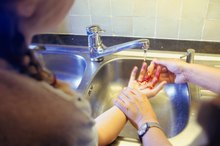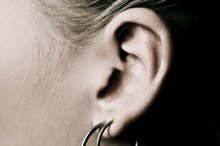How to Heal a Cut in My Nose
While cuts on your skin may heal predictably, cuts on the inside of the nose are more challenging to treat. It’s difficult to see or treat cuts in the nose, and your sinus system is lined with germ-tainted mucus, making infections a risk. These cuts are hard to reach, and a band-aid won't stick. However, with proper treatment, cuts in the nose can heal as expected.
If you are experiencing serious medical symptoms, seek emergency treatment immediately.
If the cut is bleeding, take steps to stop the flow of blood. Wash your hands with soap and water, and using a gauze or tissue, press firmly against the cut. If the bleeding in the nose was due to an injury, or if the bleeding is heavy or doesn’t stop after 20 minutes, see a doctor right away.
How to Make Cuts Heal Faster
Learn More
Clean the cut as best as you can using saline nose spray or warm saline water, which can be made by mixing 1 cup of lukewarm distilled water with 1 teaspoon of salt. Gently spray saline nose spray on the cut, if possible, or apply a saline water-soaked cotton swab or gauze to the cut, rinsing the area as best as possible. Gently blow your nose if needed to remove excess liquid. If your cut was more than a minor scratch, clean the cut daily until healed.
Prevent the affected area from drying out, as dryness will delay healing time. For minor cuts, moisten the area by applying a small amount of petroleum jelly with a clean finger or a cotton swab. You will need to repeat this step as needed during the day to keep the area moist, and repeat as many days as it takes to heal.
How to Cure Cuts Inside Your Lips
Learn More
If your cut was deep or more than 1/2 inch in length, discuss a treatment plan with your doctor. Nose cuts can get infected, so for more severe cuts, or if your immune system is suppressed, your doctor may prescribe an antibacterial nasal ointment such as Mupirocin (bactroban) 2. Mupirocin is usually to be used for several days, so apply this ointment according to your doctor’s directions 2. In some cases, your doctor may prescribe oral antibiotics as well.
Until healed, avoid hard blowing of your nose, or picking your nose, which can aggravate the cut. Also avoid removing the scab that forms over the cut, as this will delay healing. See your doctor if you have a sore in your nose that doesn’t go away after 2 weeks, if you have a fever or swelling, or if you have pain that doesn’t resolve as expected.
Related Articles
References
- Merck Manual: Bacterial Nasal Infections
- Drugs.com: Mupirocin Ointment
- Textbook on First Aid and Emergency Nursing; I Clement
Writer Bio
Jason Brick has written professionally since 1994. His work has appeared in numerous venues including "Hand Held Crime" and "Black Belt Magazine." He has completed hundreds of technical and business articles, and came to full-time writing after a long career teaching martial arts. Brick received a Bachelor of Arts in psychology from the University of Oregon.







